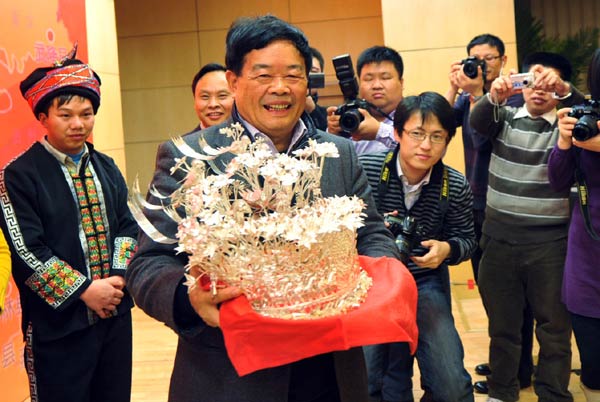Profiles
It's so much better to give
By Cheng Yingqi (China Daily)
Updated: 2011-04-29 07:49
 |
Large Medium Small |
BEIJING - When Cao Dewang first walked up the red carpet and smiled patiently to the cameras, few paid attention to this unknown face in a room crowded with China's top celebrities.
|
 |
|
Cao Dewang (center), who topped the 2010 China Philanthropy List, poses at an award ceremony for his donation of 200 million yuan ($30.7 million) for a poverty-reduction project on Jan 12 in Beijing. [Provided to China Daily] |
That is, until he was named China's biggest philanthropist a few minutes later.
Unlike previous owners of the honor, Cao had been keeping a low profile, which made his appearance a little surprising for some.
However, it wasn't surprising for people who helped Cao to hand out his donations.
In 2010 alone, the 65-year-old donated more than 1 billion yuan ($153 million) to areas suffering from natural disasters in the country, benefiting more than 500,000 people.
Among the organizations to benefit from his generosity, the China Foundation for Poverty Alleviation (CFPA) received 200 million yuan from Cao in May 2010, but he required the organization to distribute the money into the hands of about 10,000 impoverished households across nine provinces within six months.
Known as "the most demanding philanthropist" in China, Cao only allowed the CFPA to take a maximum 3 percent administration fee, in comparison to the usual 10 percent.
In addition, he required the CFPA to keep the probability of error - delivering the money to people with false claims - to below 1 percent.
With the help of 500 volunteers, the 200 million was finally distributed into the hands of 92,150 farmers who received 2,000 yuan each, with a probability of error of 0.85 percent.
"Some said 3 percent is tight, but I will squeeze the cost further next time," said Cao, president of Fuyao Group, a company engaged in the production and marketing of glass based in Fujian's capital Fuzhou.
"If the foundation spends 2,000 yuan less, we can help one more household."
Born into a poor family in Fuqing, Fujian province, Cao attended school at the age of nine but had to quit five years later.
He sold apples on the street until he found work at a State-owned glass company in the late 1970s.
In 1983, when the company was about to go bankrupt, Cao, who had become an expert in glassmaking, took over the company, which he developed into today's Fuyao Group.
Thanks to his growing experience, Cao aims to help those in need with his business success.
He has revealed on many occasions that he has always looked up to two people: Andrew Carnegie (1838-1919), the Scottish-American who donated almost his entire fortune to establish libraries, schools and universities, as well as Carnegie's Chinese equivalent Tan Kah Kee (1874-1961).
In 2009, Cao announced that after his death he would donate his family's 60-percent holdings in the Fuyao Group, equivalent to 3.8 billion yuan.
"Some critics say Chinese entrepreneurs are not philanthropic. They don't donate. But I believe there are many who are willing to donate once they get to their retirement age," Chen said. "I am an example myself. I also didn't think much about making donations years ago because I, like most Chinese entrepreneurs, was still on the way to achieve success."
He donated 3 million yuan to people whose homes were destroyed by flood in 1998, 20 million yuan to people suffering from the May 12 Wenchuan earthquake in 2008, 100 million yuan last year to relieve quake-hit Yushu in Qinghai province, and 200 million yuan to help people suffering from severe drought in Southwest China.
Some people believe that Cao and the CFPA have created a precedent to lower costs and perfect the delivery of charity funds in China. But experts said Cao's demand of a 3 percent administration fee and a 1 percent probability of error is too hard for others to emulate.
Cao does not agree.
"What do they mean by hard to emulate? The experts restrict themselves too much to theory, while we entrepreneurs are more pragmatic," he said.
Cao warns that China's public welfare policy has loopholes, like the lack of transparency.
"The laws do not require transparency of NGOs, but they do not ban it either. It is up to the foundations to reveal their expenditures," Cao said.
"It not only matters that you are taking money out of your own pocket, but where the money is going."